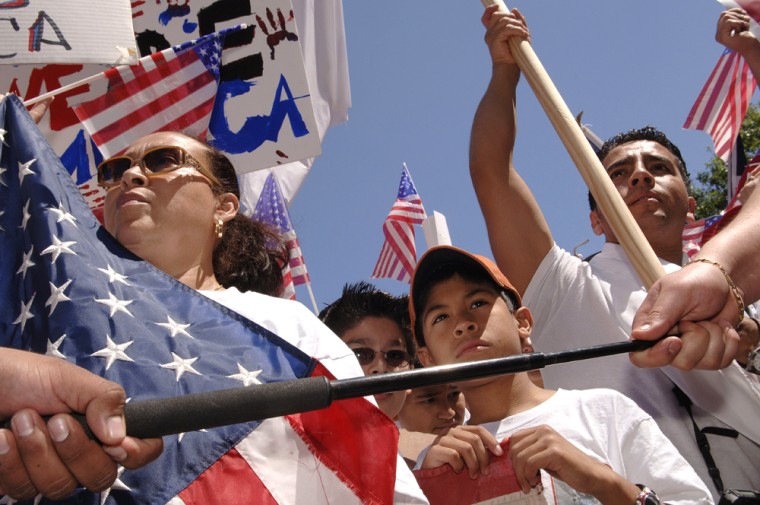LOS ANGELES — Hundreds of thousands of immigrants are taking to the streets across the country Monday in what is being billed as a national day of action for immigrant rights.
NBC News’ George Lewis reports on the nature of the widespread protests and how their grassroots organization signals a major turning point in political activism among Hispanics in the U.S.
What does the scale of the protests say about the organization of the immigration reform movement?
It is an interesting way that they are organizing this. It is really a coalition of grassroots immigration rights organizations, perhaps hundreds of such local organizations across the country, that have come together for this.
They started the planning back in December when the House passed a bill that would make it a felony to be in this country illegally, would build a big wall along the U.S.–Mexican border, and would make it a crime to help undocumented immigrants.
One thing that is driving the planning of these protests is Spanish-language radio. There are a number of radio personalities, the most prominent of whom is a guy named Eddie "Piolín"Sotelo ("Piolín" is Spanish for “Tweety Bird”).
He is syndicated in 17 Hispanic markets and is the No. 1 DJ in practically all of those markets — particularly in Phoenix — where one of the protests is scheduled for today. So he has been talking to people on the radio and sort of organizing this on the fly for a lot of these communities, telling people to get out and demonstrate in favor of immigrant rights.
What a lot of these people are concerned about is that they’ve come to this country to seek a better life, they work hard, and now America is talking about turning them into criminals. And a lot of them have children who were born here, who are U.S. citizens who are now out on the street saying, “Don’t turn my mother and my father into criminals. Don’t put them into prison or send them away.” That seems to be a lot of what’s driving this.
What is the strategy of protests, particularly now that the Senate shelved the immigration deal last week, and the lawmakers are on vacation for the next few weeks?
I think that a lot of this is aimed at countering the one bill that has passed — the House version of the immigration bill, the Sensenbrenner bill, which has all of those punitive measures for immigrants in it.
These groups would like to see a milder version of the immigration bill pass, something that has a guest worker provision in it, so that people can somehow legalize their status in this country. They want a legal alternative to coming across the border illegally without documents.
What is the expected impact? What is the likelihood that Congress will pick this issue up again when they come back from vacation since it’s an election year?
The seasoned political observers who watch these things very closely are predicting that Congress will take no action on immigration this year.
They are predicting that the whole thing will eventually die because the Republican majority in Congress sees this as a very hot issue that they don’t want to touch just leading up to an election. For example, in a lot of these areas, particularly Texas and Arizona which are considered so-called “red states,” there has been such an incredible increase in the Hispanic population. For instance, the city of Phoenix, Ariz., is now 39 percent Hispanic.
So, if the sons and daughters of these illegal immigrants start to register to vote, that’s a big political factor that makes immigration such a hot button issue.
The people rallying for immigration reform are definitely not one monolithic, homogeneous group, but does the sudden activism show the formation of a powerful new political bloc?
That’s what a lot of editorial page writers are saying today. That we may be seeing some sort of turning point in politics. Many are saying that Hispanics have discovered that if they can organize, make their voice heard, and register to vote, they can be an enormously powerful political bloc. So, I think what we are seeing is the beginnings and stirrings of a new movement among Latinos.
What is really interesting is just how improvised these hundreds and hundreds of organizations seem to be and how the main means of communication is through these radio personalities who broadcast in major Hispanic markets.
There is also a protest scheduled for May 1st that is aimed at having Latinos stay home from work for the day and boycott the purchase of goods. There was a movie released recently called “A Day without a Mexican.” In the film, California wakes up one morning to find its Latino population has vanished — chaos and comedy quickly ensue.
Now they are seriously planning to stage that sort of thing in May, just to make their impact on the labor force in this country known.
